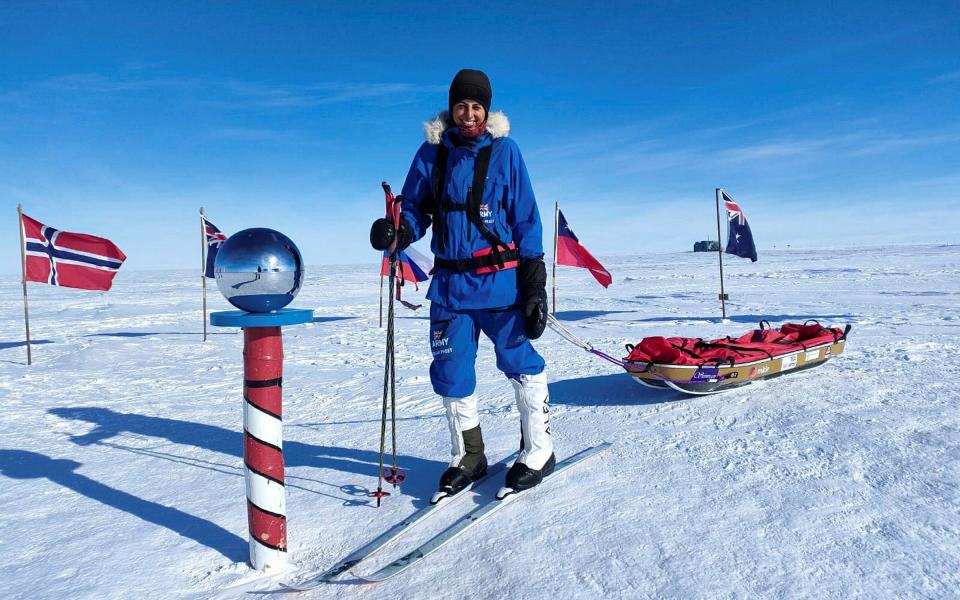‘I was 19 and flipping burgers in Derby. Then I joined the Army – in secret’

- Oops!Something went wrong.Please try again later.
Civvy Street is a new series following the lives of armed forces veterans and finding out what happened next. If you’d like to be featured contact noah.eastwood@telegraph.co.uk
Aged 19, Preet Chandi had no A-levels and was working in Burger King. “I was told I wasn’t smart enough to get into university,” she says.
Now 34, Chandi is fresh from a month-long, 700-mile trek in the Antarctic, where she became the fastest woman ever to reach the South Pole alone on skis.
“People would assume I was born on skis and had a certain upbringing,” she says. But she began life in a council house and her father worked as a taxi driver, while her mother did jobs in warehouses.
After leaving school without passing her final exams, she decided she wanted to become a physiotherapist, but lacked the qualifications. University felt like a distant prospect.
“I thought I was so far behind people my age. When you’re told you’re not smart enough, part of you believes it.”
She signed up to an access course to sit for the three A-levels required to go to university, but says it was her decision to join the Army that transformed her horizons and helped her cover the costs of higher education.

‘I kept it secret when I joined the Army’
Chandi says her eye was caught one day by an Army recruitment advert in Derby city centre.
“It looked interesting. Everyone was smiling on the posters,” she says. Shortly afterwards she joined the Territorial Army, now the Army Reserve, and trained to become a medic.
“I did not tell my family when I joined the Army. When you start doing things [different] from the expected norms it’s questioned.
“It opened up a very different world to what I was used to. I hoped it would help me get into university as well.”
After passing her A-levels she received a place at St George’s, part of the University of London, to study physiotherapy and later became the first person from her family to graduate.
She put the money from her waiting job towards living costs at university, along with “a couple of hundred pounds” for two weeks at a military camp.
Soldiers can also receive a bounty, similar to a bonus, at the end of every year, of up to about £1,000, she says.
After leaving university she went full-time with the Army. She became a lance corporal aged 22 before going on to Sandhurst and being commissioned as a second lieutenant.

Joining the regular Army as a medical officer, she served with different regiments but spent the most time with the Royal Signals based in Blandford in Dorset.
“I remember my brother dropping me off in a van. It was a bit daunting and it was dark and wintry,” Chandi says.
“I never thought I would be an Army officer at all.” By 27 she had been promoted to the rank of captain.
She completed tours of South Sudan on a humanitarian mission with the UN and Nepal as part of the Army’s programme for the recruitment of Gurkhas.
‘I had no idea who Shackleton was when I planned for the Antarctic’
Travelling the world with the Army had left her hungry for more challenges and propelled her into trekking in the Antarctic.
While serving abroad she discovered a passion for endurance sports, such as running a 40-mile team marathon around the camp.
She followed this by taking part in the Marathon des Sables, a 156-mile “ultra-marathon” across the Sahara. “I became someone who pushed my boundaries more through the Army. I just wanted more and more,” she says.
She decided to take a career break and go on unpaid leave to try to cross the Antarctic solo in 2021.
“I didn’t know anything about [the polar explorer Sir Ernest] Shackleton and had never even known his name before,” she says.
She says she “started on Google” how to journey to the South Pole even though she had no previous experience of extremely cold climates.
“I started training and decided I wanted to [attempt a] partial crossing of Antarctica on my own,” she says. The journey from Hercules Inlet to the South Pole covered 700 miles and saw her transport a 90kg sled laden with food and other supplies.

The trip’s logistics were handled by an expeditions firm, which had initially rejected her application on the basis that she lacked experience, she says.
Completing the journey in just over 40 days, she became the third-fastest woman to reach the pole solo and unassisted.
“It was the hardest thing I had ever done. I ended up hallucinating towards the end,” she says.
“It came on insanely vividly. I remember having this little dog with me and a little old lady.”
A year later, in January 2023, she returned in an attempt to become the first woman to cross the Antarctic from one side to the other, but stopped short of the goal at 868 miles, although she still achieved the longest unsupported solo expedition ever completed by a woman in the region.
In December she claimed to have broken the record for the fastest solo expedition completed by a female on skis to the South Pole, in 31 days, 13 hours and 19 minutes.
She says the idea to begin her Antarctic adventures did “not come from the Army” but she “wouldn’t be the person I am who had these ideas if I hadn’t been in [the Army]”.
“Being in a field and digging a hole and then living in that hole or staying awake in the middle of the night becomes normal,” she adds.
Recommended
‘I got in fights, I stole, I was trouble – but the Army transformed me into a chief executive’

